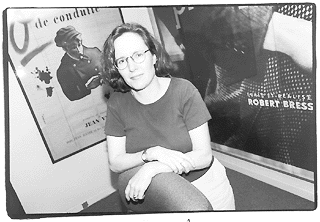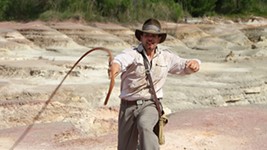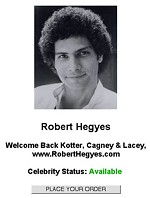New Director on the Block
Rebecca Campbell and the Texas Documentary Tour
By Sarah Hepola, Fri., June 5, 1998
|
|
Austin Film Society managing director Rebecca Campbell's move to Austin six years ago was a fortuitous collision of circumstance and fate. "I was looking for a place to put roots down," she recalls. "I went to a concert at McCabe's Guitar Shop in Santa Monica. I just sort of wandered in to see Jimmie Dale Gilmore and Butch Hancock, and their vibe was so incredible that I thought a place that supports that kind of music has got to be a great place to live. We were giving them an ovation at the end, and Butch Hancock said, `Well if you wanna hear more, come to Austin.' So I did."
And the rest, as they say, is her story.
But it is also the story of the Austin Film Society (AFS), which over 13 years has become an integral player in the city's thriving independent film community, providing financial grants totaling $80,000 to 31 emerging film and video artists of Texas during the first two years of the Texas Filmmakers' Production Fund and assuring a year-round forum for the exhibition of quality films. Last year alone, the Film Society screened 140. It is the story of transition and growth, both for Campbell and AFS, of an evolution in which each change strengthens the infrastructure so that in forging ahead, Campbell can stand on the shoulders of giants, both founder and artistic director Richard Linklater and former managing director Elizabeth Peters, from whom Campbell inherited the position last month. Peters remains involved with the Film Society as a board member.
"Rick quietly guides the Film Society," Campbell explains. "The Film Society has grown a lot, and its growth can also be attributed to the fact that they hired a real powerhouse person in Elizabeth, and she really incubated it and grew it and turned it into an incredibly dynamic organization. I also think that the time had come, that the community was ready to embrace and support a higher level of programming."
Campbell is quick to point out that she is not interested in tearing down anything the AFS has so far built. "I want to keep the Film Society exactly how it is. But I would like to establish the support to keep two full-time employees for an extended amount of time." In other words, they always need more money. "Yes, the Almighty Dollar," Campbell concedes, and laughs. Some things never change.
But transition is commonplace for Campbell who, as the daughter of a diplomat, grew up moving between Virginia and Africa. So after finishing her undergraduate degree in Comparative Literature at UVA, it is not surprising she went nomadic for a while, moving from Virginia to San Francisco and then Los Angeles, where she worked extensively in nonprofits.
So how did she end up making documentaries? "I've always been one of these people," she explains, "ever since I was little, that just was horrified by injustice, and couldn't understand why everybody else wasn't. All the nonprofits that I've been involved in had to do with getting people access to justice."
And it is this same impulse to right society's wrongs that led to film school, where Campbell would eventually continue to explore, from a more personal perspective, similar social ills. It's not that nonprofit work was unfulfilling. "At some point I just realized that one minute on national television could have more impact than three years of community organizing."
So she enrolled in the University of Texas at Austin. "I didn't go to film school with big plans," she recalls. "I was hoping I would discover some hidden talent or something that I really loved to do in the process." What she confronted instead was the throngs of people wanting to make films, the isolation, the creative demands, and the technical minutiae any director must wrestle. Many of these lessons came in the two years it took to finish "The Town That Jack Built," Campbell's half-hour documentary thesis, which tells the story of a dying mining town in Picher, Oklahoma.
"Everybody that I met there was really knowledgeable about the mining industry and they were really stuck in the past. That's what they wanted to talk about. And I got intrigued, and I essentially documented, in a pretty straightforward way, what the mining was like and what happened to the town as a result of the mining going away."
Although the process was rewarding, Campbell was also ready for a change of pace, and it is here in our story that her two areas of expertise - film and nonprofit - so shamelessly coalesce.
"One thing I wasn't able to do in film school was give to the community, because I spent all my time just getting through school and making a living. It's really important to me to be involved in the community. And also knowing people. If you wanna be a filmmaker you had better know people. If you don't have money, then your connections are all you've got."
Which brings us to her position as managing director and to this summer, when the AFS benefit premiere of Steven Soderbergh's new film, Out of Sight, is in the works, and when the Summer Free-for-All will treat the city to an eclectic mix of quality film fare. The programming is selected by the AFS board of directors and a group of reliable consultants including Linklater and former programming director Jerry Johnson, but Campbell stresses an interest in fine-tuning it to meet consumer demand. "They come up with ideas for series. But we're always open to people's ideas. The best way to give us ideas is to be very specific about the film, the filmmaker, the condition of the print, and where we would be able to get the print. The more specific the idea, the more likely it is we will be able to follow up on it."
In the meantime, Campbell is occupied with the legwork of making all this come off without a hitch. "Fortunately," she remarks, "what the public sees is the fun part, which is showing great films, and having really fun premieres. But that's our public face. Our private face is really long hours, many from volunteers and interns, trying to keep things running smoothly so that we will have that public face.
"A lot of what goes into making the Film Society successful is a mix of a strong work ethic combined with vision, contacts, and experience in the field."
In the middle of Rebecca Campbell's new house, there is a wall torn down. Mighty planks peppered with nails stand starkly in the middle of a tasteful living room. Eventually, a new wall will go up - in fact, the whole room will change. But the planks can't be taken down, of course, because they hold up the entire roof. As usual, it is a flurry of change around her. So now it is Rebecca Campbell's turn to strengthen the infrastructure, to assure the Austin Film Society remains a sturdy home, and a shelter for years to come.
Rebecca Campbell will screen "The Town That Jack Built" as part of June's "Documents of Persons & Place" program of the Texas Documentary Tour. See sidebar for more information.









